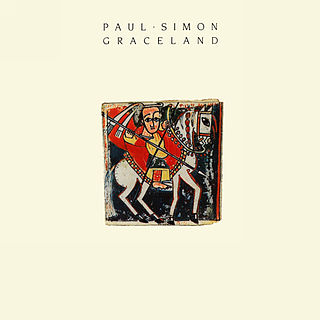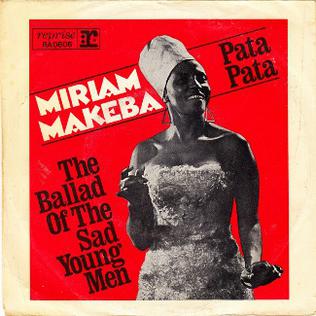
Hugh Ramapolo Masekela was a South African trumpeter, flugelhornist, cornetist, singer and composer who was described as "the father of South African jazz". Masekela was known for his jazz compositions and for writing well-known anti-apartheid songs such as "Soweto Blues" and "Bring Him Back Home". He also had a number-one US pop hit in 1968 with his version of "Grazing in the Grass".
Given the vastness of the African continent, its music is diverse, with regions and nations having many distinct musical traditions. African music includes the genres amapiano, Jùjú, Fuji, Afrobeat, Highlife, Makossa, Kizomba, and others. African music also uses a large variety of instruments across the continent. The music and dance of the African diaspora, formed to varying degrees on African musical traditions, include American music like Dixieland jazz, blues, jazz, and many Caribbean genres, such as calypso and soca. Latin American music genres such as cumbia, salsa music, son cubano, rumba, conga, bomba, samba and zouk were founded on the music of enslaved Africans, and have in turn influenced African popular music.

Graceland is the seventh solo studio album by the American singer-songwriter Paul Simon. It was produced by Simon, engineered by Roy Halee and released on August 25, 1986, by Warner Bros. Records.

The Rhythm of the Saints is the eighth solo studio album by American singer-songwriter Paul Simon, released on October 16, 1990, on Warner Bros. In much the same way that Simon's 1986 album Graceland drew upon South African music, this album was inspired by Brazilian musical traditions. Like its predecessor, the album was commercially successful and received mostly favorable reviews from critics.

Zenzile Miriam Makeba, nicknamed Mama Africa, was a South African singer, songwriter, actress, and civil rights activist. Associated with musical genres including Afropop, jazz, and world music, she was an advocate against apartheid and white-minority government in South Africa.
Mbongeni Ngema is a South African writer, lyricist, composer, director, choreographer and theatre producer, born in Verulam, KwaZulu-Natal. He started his career as a theatre backing guitarist. He wrote the multi-award-winning musical Sarafina! and co-wrote the multi-award-winning Woza Albert! He is known for plays that reflect the spirit of black South Africans under apartheid.
Busi Mhlongo, born as Victoria Busisiwe Mhlongo, was a singer, dancer and composer originally from Inanda in Natal, South Africa.

Freshlyground are a South African Afro-fusion band that formed in Cape Town in 2002. The band members have different backgrounds, including South Africa, Mozambique, and Zimbabwe. Freshlyground's musical style blends elements of traditional South African music, blues, jazz, and features of indie rock. They are best known for their performance "Waka Waka " with Colombian singer Shakira, which received worldwide recognition. The music video – featuring the group – also received over 3 billion views on YouTube, making it the 21st most watched video on the entire site.

Simon "Mahlathini" Nkabinde was a South African mbaqanga singer. Known as the "Lion of Soweto", Nkabinde is the acknowledged exponent of the deep-voiced, basso profundo "groaning" style that came to symbolize mbaqanga music in the 1960s. Nkabinde was also a very active live performer in South Africa, recording and performing with the Mahotella Queens and the backing Makgona Tsohle Band from 1964 to 1971, and then again from 1983 to 1999. The Mahlathini and the Mahotella Queens act was propelled into international stardom in the wake of Paul Simon's 1986 Graceland album.

"Pata Pata" is an Afro-pop dance song popularized internationally by South African singer Miriam Makeba. "Pata Pata" is credited to Makeba and Jerry Ragovoy. Her most popular recording of "Pata Pata" was recorded and released in the United States in 1967. The song is considered by many to be Makeba's signature hit and it has since been recorded by many artists.

Welela is an album by the South African musician Miriam Makeba, released in 1989. It was produced primarily by Sipho Mabuse.

An Evening with Belafonte/Makeba is a Grammy Award-winning 1965 album by Harry Belafonte and Miriam Makeba, released by RCA Victor. It was the second outcome of the long lasting collaboration between Belafonte and Makeba, the first being the appearance of Makeba in the song "One More Dance" on Belafonte's 1960 album, Belafonte Returns to Carnegie Hall.
Elisa Domingas Jamisse mostly known by her stage name 'Mingas' is a Mozambican singer. Born in the capital city, Maputo in Mozambique Mingas started to sing at a very early age. Her music is a mixture of Afro sounds that gives prominence to the rhythms of the Chope people of southern Mozambique, and she is one of the most famous singers of Marrabenta. Her career is marked with big hits and collaborations with major African singers like Miriam Makeba, Hugh Masekela, Angélique Kidjo, Baba Maal, Yvonne Chaka Chaka, Jimmy Dludlu, Gilberto Gil, among others.
A sangoma a is practitioner of traditional medicine.
"Soweto Blues" is a protest song written by Hugh Masekela and performed by Miriam Makeba. The song is about the Soweto uprising that occurred in 1976, following the decision by the apartheid government of South Africa to make Afrikaans a medium of instruction at school. The uprising was forcefully put down by the police, leading to the death of between 176 and 700 people. The song was released in 1977 as part of Masekela's album You Told Your Mama Not to Worry. The song became a staple at Makeba's live concerts, and is considered a notable example of music in the movement against apartheid.

You Told Your Mama Not to Worry is the twentieth studio album by South African musician Hugh Masekela. It was recorded in Kumasi, Ghana, and released on 9 November 1977 via Casablanca Records label.

The apartheid regime in South Africa began in 1948 and lasted until 1994. It involved a system of institutionalized racial segregation and white supremacy, and placed all political power in the hands of a white minority. Opposition to apartheid manifested in a variety of ways, including boycotts, non-violent protests, and armed resistance. Music played a large role in the movement against apartheid within South Africa, as well as in international opposition to apartheid. The impacts of songs opposing apartheid included raising awareness, generating support for the movement against apartheid, building unity within this movement, and "presenting an alternative vision of culture in a future democratic South Africa."
This is a discography of South African musician Miriam Makeba (1953-2008).

The Many Voices of Miriam Makeba is a 1962 studio album of Miriam Makeba.

Journey of Dreams is an album by the South African vocal group Ladysmith Black Mambazo, released in 1988. Journey of Dreams also served as the title of a film about frontman Joseph Shabalala, directed by David Lister and shot around the same time. Shabalala chose the title in part to describe his journey from his birthplace of Ladysmith to international success. It also refers to his desire to get the sound he heard in his dreams on to record.












